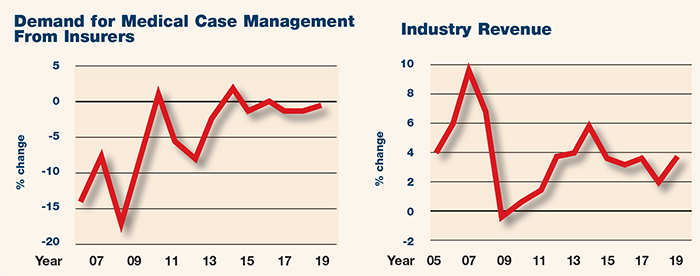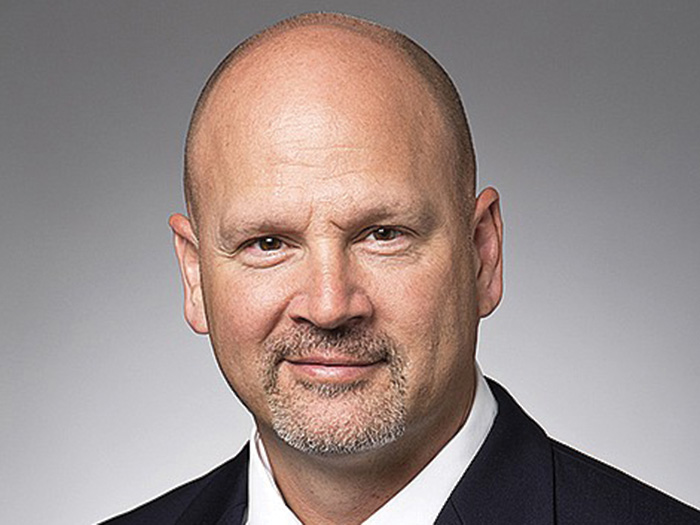Workers' Compensation
The Balancing Act of Rehabbing Injured Workers

Putting injured employees at ease, educating cost-conscious employers, and tactfully questioning doctors’ treatment decisions are among the responsibilities workers’ compensation nurse case managers must balance. Added to that, their role has grown increasingly demanding.
More regulatory requirements and claims-payer demands, rising claim complexity, and more service providers involved in a claim’s management make it a very different job today than it was a few years ago, experts said.
Despite the job’s heightened challenges, however, some things remain the same, said Anne Kirby, chief compliance officer and vice president of medical review services for Rising Medical Solutions.
“I find in hiring nurses that the one thing that hasn’t changed is their interest and their dedication to doing the right thing for injured workers,” said Kirby, a registered nurse.
“I don’t see that that has changed at all.”
Claims-Payer Representatives
While guiding injured workers through workers’ comp medical treatment is a primary job focus, the nurses also represent the interests of employers and other claims payers.
“You either love this [work], or you hate it.” — Kim Weaver, an RN and director of professional services at M Hayes
They often form the front line of claims management to ensure workers receive the proper care necessary to expeditiously return to the job, while making sure payers don’t fund unnecessary claim expenses.
That often requires advocating for workers while collaborating with doctors, attorneys, therapists and other service providers. Other times it requires questioning the necessity of those service providers or their decisions.
“In the world of comp you have people who are welcoming you,” including doctors and patients, said Kim Weaver, an RN and director of professional services at M Hayes, a case management company recently acquired by GENEX Services LLC.
“They want to work with you because they see you as an advocate or as a conduit [for their medical care].”
But there are also physicians who believe insurance industry nurses are only there to delay or stop their treatment plans, Weaver said.
Requesting that a doctor consider a different treatment path requires tact and careful wording to avoid offending egos, said Susan Mitchell, an RN and case manager at The Travelers Cos. Inc.
“It’s all a matter of how you present it to them,” she said. “If you come across saying, ‘Your decision on this treatment is not working,’ then they will get defensive and not want to talk to you.”
She carefully explains to doctors when she observes that a patient isn’t improving and asks the physician if they can “talk about something else that might help” the patient, Mitchell said.
Gaining Worker Trust
A key challenge is winning worker trust, particularly for telephonic case managers who don’t have the advantage of working bedside like a hospital nurse, said Amy Jeffries, an RN and nurse manager for Bunch CareSolutions, a unit of Xerox Corp. providing workers’ comp managed care services.
Injured workers are often scared and confused because they have never before suffered a work injury, so they don’t understand workers’ comp, Jeffries added.
“The biggest challenge is establishing a relationship by phone,” she said. “We don’t have that face-to-face contact so from the very beginning it is very important to work to establish trust.”
That requires following through with all promises.
“If you tell the injured worker, ‘I am going to call you back two days after your [medical] appointment,’ follow through and do that because by doing that, you establish that level of trust,” Jeffries said.
The same occurs when workers’ comp nurses provide face-to-face care for workers who have suffered previous workplace injuries, according to Mitchell.
“Initially, they are cautious with me,” she said.
“A lot of people, especially if they have had multiple work comp injuries and they have a history with it, look at me like I am representing the insurance company and I’m going to tell them they can’t have this [treatment] or we are not going to approve that [procedure].”
Mitchell is a case manager working under Travelers’ ConciergeCLAIM nurse program that places nurses in medical provider clinics treating injured workers.
She wins injured worker trust with assurances that she is their advocate and by following through with any promises, such as to obtain answers to questions she can’t immediately answer.
Margie Matsui, western nurse case manager for employer LSG Sky Chefs, said she carefully explains to injured workers why she asks specific questions about their injury, prior health conditions and issues such as their normal sleep pattern.
Explaining the reasons for her questions helps build trust while she learns whether she can teach them about measures for improving their health and whether there are medical complications that need addressing.
Challenges and Rewards
Nurses on the front lines also hear from frustrated injured workers venting about the work comp system or their injury status. But unlike bedside hospital nurses working with an unhappy patient for a few days, a case manager may interact with a disgruntled injured worker for months.
You can’t take negative attitudes personally, nurses advised. Do that, and you may not last in the job.
“You either love this [work], or you hate it,” Weaver said.
The work hours and less physically demanding roles are frequently cited reasons RNs leave a hospital to become a case manager, several sources said. Unlike hospital work, case management typically does not require weekends, nights or holidays.
They also apply their professional skill set in a different manner.
Where hospital nurses provide direct care, nurse case managers spend more time evaluating patients to determine whether they are progressing under their current treatment regimen, Weaver said.
That may require collaborating with a physical therapist, for example, to learn whether the patient is improving and whether their physician needs notification that a different program may be in order.
Nurses say they like the job because of the reward of seeing injured employees progress after working to get them the best medical care for their specific needs.
“There is nothing better than at the end of the file when you are getting ready to close it, looking back and seeing the progress that has been made,” Jeffries said.
Jeffries cited the example of a young worker whose hand got stuck in a piece of equipment, causing extensive nerve damage.
“With this particular gentleman, I didn’t leave my desk at the end of the day without thinking about him and thinking about how he was doing,” Jeffries said.
With the right care “he ended up doing very, very well” with very few limitations.
“It was definitely a success given the extent of his injuries in the beginning,” Jeffries said. “That is definitely one I was very proud of.”
Observers commonly think that telephonic nurse case managers may be less caring than hospital bedside nurses, but such experiences prove differently, Jeffries added.
Meanwhile, today’s nurses are under greater pressure to follow processes and protocols set by insurers, third-party administrators and employers, and they must show a return on investment from their services.
An employer may not immediately agree with a nurse’s care decision even when the decision is based on a professional opinion that spending additional dollars up-front for certain treatment could ultimately result in a speedier recovery, shorter claim duration, and fewer costs in the long run.
“Sometimes doing the right thing for the patient isn’t always seen as doing the right thing by the employer who pays for it all,” said Natalie Rivera, an RN and assistant vice president of clinical solutions at Bunch CareSolutions.
“It’s really balancing those two [demands],” she said. “Doing the right thing for the patient — if you do that, the rest falls into place. But sometimes it’s educating the employer on why this is the right thing to do.”
In addition to increased demands to reduce costs and follow processes, nurses now face medical cases that are more complex than in years past. Claims analytics currently help direct nurses only to patients likely to benefit from their services, but that means RNs will see a higher percentage of injured workers with complex claims.
There are also mandated state treatment guidelines that didn’t exist before, rapidly changing treatment practices, and increasingly complicated pharmaceutical regimens, Kirby said.
“It’s a level of complication that nurses just didn’t have to deal with before,” she added.
Yet that doesn’t change one key role for nurse case managers.
They work to drive collaboration so injured workers, employers, doctors, insurers, and physical therapists, among others, aim for the same goal, said Liz Thompson, CEO at Encore Unlimited LLC, a case management company.
“Our job,” Thompson said, “is to say if this is our goal, and everyone is on the same page, then let’s keep our path real clear about how we are going to get there.”
Read the other installments of our three-part series on nurse case management:
 Part I: On the Case
Part I: On the Case
Payers are looking for spirited nurse case managers who will be patient motivators and advocates, not slaves to process.
 Part II: How Much Is Too Much?
Part II: How Much Is Too Much?
Nurse case managers can provide vital consultation, but contractual limits to the expenses associated with the service are advisable.











